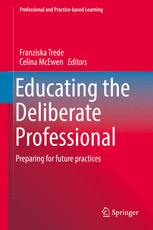

Most ebook files are in PDF format, so you can easily read them using various software such as Foxit Reader or directly on the Google Chrome browser.
Some ebook files are released by publishers in other formats such as .awz, .mobi, .epub, .fb2, etc. You may need to install specific software to read these formats on mobile/PC, such as Calibre.
Please read the tutorial at this link: https://ebookbell.com/faq
We offer FREE conversion to the popular formats you request; however, this may take some time. Therefore, right after payment, please email us, and we will try to provide the service as quickly as possible.
For some exceptional file formats or broken links (if any), please refrain from opening any disputes. Instead, email us first, and we will try to assist within a maximum of 6 hours.
EbookBell Team

4.4
62 reviewsThis book takes a fresh look at professional practice and professional education. In times of increased managerialism of academic teaching and a focus on graduate learning outcomes, it discusses possibilities to teach and learn otherwise. A deliberate professional is someone who consciously, thoughtfully and courageously makes choices about how to act and be in the practice world. A pedagogy of deliberateness is introduced that focuses on developing the following four characteristics of professionals: (1) deliberating on the complexity of practice and workplace cultures and environments; (2) understanding what is probable, possible and impossible in relation to existing and changing practices; (3) taking a deliberate stance in positioning oneself in practice as well as in making technical decisions; and (4) being aware of and responsible for the consequences of actions taken or actions not taken in relation to the ‘doing’, ‘saying’, ‘knowing’ and ‘relating’ in practice.
Educating the deliberate professional is a comprehensive volume that carves out and explores a framework for a pedagogy of deliberateness that goes beyond educating reflective and deliberative practitioners. As a whole, this book argues for the importance of educating deliberate professionals, because, in the current higher education climate, there is a need to reconcile critique (thinking), participation (doing) and moral responsibility (relating to others) in professional practice and professional education.